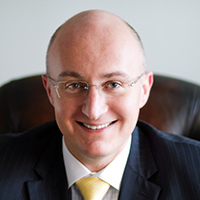What Kind of Investor Will You Be In Retirement?
You’ve saved and invested to get to retirement, but now that you’re actually there, you may need to make a new plan.


Profit and prosper with the best of Kiplinger's advice on investing, taxes, retirement, personal finance and much more. Delivered daily. Enter your email in the box and click Sign Me Up.
You are now subscribed
Your newsletter sign-up was successful
Want to add more newsletters?

Delivered daily
Kiplinger Today
Profit and prosper with the best of Kiplinger's advice on investing, taxes, retirement, personal finance and much more delivered daily. Smart money moves start here.

Sent five days a week
Kiplinger A Step Ahead
Get practical help to make better financial decisions in your everyday life, from spending to savings on top deals.

Delivered daily
Kiplinger Closing Bell
Get today's biggest financial and investing headlines delivered to your inbox every day the U.S. stock market is open.

Sent twice a week
Kiplinger Adviser Intel
Financial pros across the country share best practices and fresh tactics to preserve and grow your wealth.

Delivered weekly
Kiplinger Tax Tips
Trim your federal and state tax bills with practical tax-planning and tax-cutting strategies.

Sent twice a week
Kiplinger Retirement Tips
Your twice-a-week guide to planning and enjoying a financially secure and richly rewarding retirement

Sent bimonthly.
Kiplinger Adviser Angle
Insights for advisers, wealth managers and other financial professionals.

Sent twice a week
Kiplinger Investing Weekly
Your twice-a-week roundup of promising stocks, funds, companies and industries you should consider, ones you should avoid, and why.

Sent weekly for six weeks
Kiplinger Invest for Retirement
Your step-by-step six-part series on how to invest for retirement, from devising a successful strategy to exactly which investments to choose.
Investors who enter retirement without a well-thought-out plan risk making bad investment choices, paying unnecessary taxes or running out of money in retirement. Sometimes the self-made plan will fail to provide the financial success retirees sought.
As a financial adviser, I find most retirees have the same goals:
- Ensure their incomes will last for as long as they do and will increase as the cost of living increases.
- Protect their savings from unexpected health care costs, including long-term care.
- Reduce tax liability in retirement.
- Increase their wealth and pass as much as possible on to the next generation, without taxes taking too great a bite out of it.
Pursuing these goals requires a solid plan, one that can be established with the help of a financial adviser. Should you choose this route, the first step is to make sure the adviser knows as much about you as possible. What are your interests? What is your lifestyle? And, perhaps most important, what kind of investor do you want to be?
From just $107.88 $24.99 for Kiplinger Personal Finance
Become a smarter, better informed investor. Subscribe from just $107.88 $24.99, plus get up to 4 Special Issues

Sign up for Kiplinger’s Free Newsletters
Profit and prosper with the best of expert advice on investing, taxes, retirement, personal finance and more - straight to your e-mail.
Profit and prosper with the best of expert advice - straight to your e-mail.
By establishing well-defined objectives, you’ll be on your way to achieving the financial success you seek.
A Purpose-Based Plan
Creating a good plan includes setting clear objectives and aligning them in a customized strategy that targets each of these goals. There is no one-size-fits-all in retirement.
Know why you’re investing, and then determine what kind of investor you can afford to be. The choice to invest conservatively, moderately or aggressively should be based on your ability and objectives, willingness and need to take risk.
Conservative investors look to reduce risk by placing their money in investments that offer more protection and reduce volatility.
Moderate investors are willing to take higher risks.
Aggressive investors can take risks — either because they know their pension and other income will meet their lifestyle needs, or because they’re a ways away from retirement and have a longer time frame to recover any losses.
Imagine a pie cut into three slices with the size of each representing how much of your portfolio you will need to meet each goal.
The first slice represents the inflation-adjusted lifetime income you will need. Investments in this slice should have the lowest level of volatility. Investments in the second slice should be allocated based on your medium-term goals. Consider allocating the funds in the second, moderate slice for lifestyle choices and wishes, such as travel, desirable (but not must-have) purchases or charitable donations. The third slice would then serve building your wealth not only for you, but also for the future generations. This third slice could be invested more aggressively because you can leave it invested for a decade or two. Of course, tax-efficient strategies that reduce tax liability should be in place in all three slices.
The purpose-based plan challenges the Rule of 100, which many advisers continue to use.
Rule of 100
This long-standing rule of thumb suggests that a retiree of age 65 should place 65% of their funds in investments such as bonds, leaving 35% to be invested in equities. This would change as the retiree grows older, 70%-30%, 80%-20%, and so on with the level of risk dropping.
This approach sounds simple enough. But what happens if the majority of a retiree’s investments are in bonds, and the interest rate increases? In that situation, bonds will lose value.
That kind of scenario is why it’s important to have a plan that also offers flexibility.
Most people don’t have a plan, some take unnecessary higher levels of risk than they should, while others miss out on the potential gains by investing too conservatively. Meeting with a financial adviser, someone held to a fiduciary standard who is legally obligated to act in your best interests and who will establish a plan customized to help you work toward meeting your needs and desires during retirement is likely to increase chances of success for achieving your goals.
Daniel Shub is the founder of OCTO Capital and Shub & Company. Daniel holds the Registered Financial Consultant® designation, has passed the Series 65 securities exam and holds a Michigan insurance license.
Rozel Swain contributed to this article.
Profit and prosper with the best of Kiplinger's advice on investing, taxes, retirement, personal finance and much more. Delivered daily. Enter your email in the box and click Sign Me Up.

Daniel Shub is the founder of OCTO Capital and Shub & Company. Since 1997, he has worked in the financial services industry, specifically focusing on clients' goals and wealth protection for retirement. He also authored the book, Retirement IQ. Shub holds the Registered Financial Consultant® designation, has passed the Series 65 securities exam and is insurance licensed.
-
 Over 65? Here's What the New $6K Senior Bonus Deduction Means for Medicare IRMAA
Over 65? Here's What the New $6K Senior Bonus Deduction Means for Medicare IRMAATax Breaks A new deduction for people over age 65 has some thinking about Medicare premiums and MAGI strategy.
-
 U.S. Congress to End Emergency Tax Bill Over $6,000 Senior Deduction and Tip, Overtime Tax Breaks in D.C.
U.S. Congress to End Emergency Tax Bill Over $6,000 Senior Deduction and Tip, Overtime Tax Breaks in D.C.Tax Law Here's how taxpayers can amend their already-filed income tax returns amid a potentially looming legal battle on Capitol Hill.
-
 5 Investing Rules You Can Steal From Millennials
5 Investing Rules You Can Steal From MillennialsMillennials are reshaping the investing landscape. See how the tech-savvy generation is approaching capital markets – and the strategies you can take from them.
-
 When Estate Plans Don't Include Tax Plans, All Bets Are Off: 2 Financial Advisers Explain Why
When Estate Plans Don't Include Tax Plans, All Bets Are Off: 2 Financial Advisers Explain WhyEstate plans aren't as effective as they can be if tax plans are considered separately. Here's what you stand to gain when the two strategies are aligned.
-
 Counting on Real Estate to Fund Your Retirement? Avoid These 3 Costly Mistakes
Counting on Real Estate to Fund Your Retirement? Avoid These 3 Costly MistakesThe keys to successful real estate planning for retirees: Stop thinking of property income as a reliable paycheck, start planning for tax consequences and structure your assets early to maintain flexibility.
-
 I'm a Financial Planner: These Small Money Habits Stick (and Now Is the Perfect Time to Adopt Them)
I'm a Financial Planner: These Small Money Habits Stick (and Now Is the Perfect Time to Adopt Them)February gets a bad rap for being the month when resolutions fade — in fact, it's the perfect time to reset and focus on small changes that actually pay off.
-
 Social Security Break-Even Math Is Helpful, But Don't Let It Dictate When You'll File
Social Security Break-Even Math Is Helpful, But Don't Let It Dictate When You'll FileYour Social Security break-even age tells you how long you'd need to live for delaying to pay off, but shouldn't be the sole basis for deciding when to claim.
-
 I'm a Wealth Adviser Obsessed With Mahjong: Here Are 8 Ways It Can Teach Us How to Manage Our Money
I'm a Wealth Adviser Obsessed With Mahjong: Here Are 8 Ways It Can Teach Us How to Manage Our MoneyThis increasingly popular Chinese game can teach us not only how to help manage our money but also how important it is to connect with other people.
-
 Global Uncertainty Has Investors Running Scared: This Is How Advisers Can Reassure Them
Global Uncertainty Has Investors Running Scared: This Is How Advisers Can Reassure ThemHow can advisers reassure clients nervous about their plans in an increasingly complex and rapidly changing world? This conversational framework provides the key.
-
 Should You Jump on the Roth Conversion Bandwagon? A Financial Adviser Weighs In
Should You Jump on the Roth Conversion Bandwagon? A Financial Adviser Weighs InRoth conversions are all the rage, but what works well for one household can cause financial strain for another. This is what you should consider before moving ahead.
-
 The 8 Stages of Retirement: An Expert Guide to Confidence, Flexibility and Fulfillment, From a Financial Planner
The 8 Stages of Retirement: An Expert Guide to Confidence, Flexibility and Fulfillment, From a Financial PlannerRetirement planning is less about hitting a "magic number" and more about an intentional journey — from understanding your relationship with money to preparing for your final legacy.